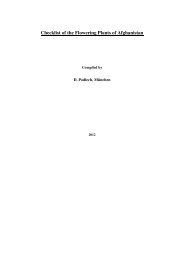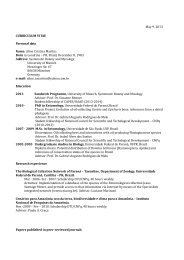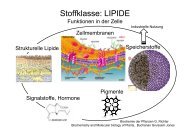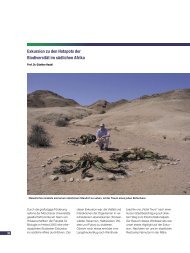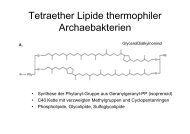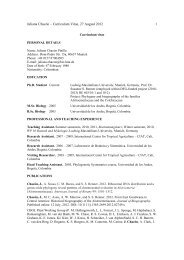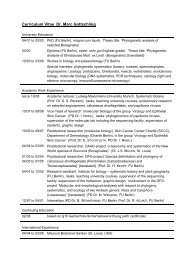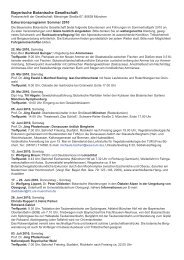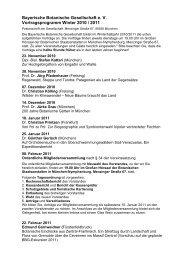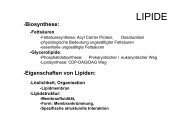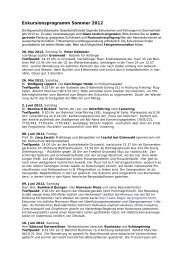announcement - Systematic Botany and Mycology
announcement - Systematic Botany and Mycology
announcement - Systematic Botany and Mycology
You also want an ePaper? Increase the reach of your titles
YUMPU automatically turns print PDFs into web optimized ePapers that Google loves.
jointly organized by the<br />
First West African mycological training course<br />
Togo, 12th to 24th June 2011<br />
Laboratory of <strong>Systematic</strong> <strong>Mycology</strong><br />
Department for Biology I, LMU München, Germany<br />
coordinator: Dr. Yorou, Menzinger Str. 67, D-80638, Munich,<br />
Tel +498917861203, email. n.s.yorou@bio.lmu.de<br />
<strong>and</strong><br />
Department of Botanic <strong>and</strong> Plant Ecology,<br />
University of Lomé, Togo<br />
Contact. Dr. Guelly, BP 1515 Lomé Togo<br />
tel. +2282255094, email. atsuguelly@yahoo.fr<br />
under scientific mentorship of<br />
Prof. Dr. Reinhard AGERER<br />
Laboratory of <strong>Systematic</strong> <strong>Mycology</strong><br />
Department for Biology I, LMU München, Germany<br />
Tel. +498917861234, email. reinhard.agerer@bio.lmu.de<br />
1. Justification <strong>and</strong> background<br />
West Africa is commonly indexed as a mycological desert in the scientific community of<br />
mycologists. The reasons are not that this area is poor in fungi. The Fungus/plant ratio 6/1<br />
provides a conservative estimate of 18 000 fungal species for Benin as an example, among them<br />
larger fungi account for about 20% (about 3600 species for Benin). This figure taken from Benin<br />
attests on the very high fungal diversity in West Africa due not only to the presence of important<br />
symbiotic tree species but also to the great diversity patterns of the vegetation. Fungal diversity in<br />
West Africa is beyond expectations, but the quite paucity of local mycologists coupled with<br />
insufficient infrastructures resulted in a poor <strong>and</strong> scant documentation on West African fungi <strong>and</strong><br />
subsequent collection centres. On the other h<strong>and</strong>, the limited time devoted to mycological teaching<br />
(which is sometimes totally untaught in some universities) <strong>and</strong> research yielded incomplete life<br />
science curricula at the universities <strong>and</strong> insufficient biological skills of local students. There is an<br />
obvious need to rethink academic curricula so as to devote more time to mycology at West African<br />
universities <strong>and</strong> schools, whilst actions to secure local collection centres <strong>and</strong> subsequent<br />
infrastructures should be undertaken by decision makers <strong>and</strong> academics. The lack of national<br />
mycological capacities resulted in a poor valorisation of Wild Useful Fungi, an absence of<br />
domestication policies of wild species <strong>and</strong> a paucity of subsequent national programmes of<br />
mushrooms´ cultivation/valorization. There is no doubt that wild edible fungi play a paramount<br />
nutritional role for local inhabitants. Fungal resources can be used to increase cash incomes of<br />
villagers whilst accurate ecological applications of their symbiotic relationship with forest trees can<br />
substantially increase the growth <strong>and</strong> regeneration of selected trees in national re-forestation<br />
programmes. Unfortunately, due to the lack of national capacities, fungal resources are actually<br />
under-utilized. During the last decade however, great effort has been invested to build mycological<br />
capacities in West Africa. Thanks to fruitful collaborations with the National Botanic Garden of<br />
Belgium, the University of Munich (Germany, through financial support from the German Academic<br />
Exchange Service-DAAD <strong>and</strong> the German Research Foundation-DFG) <strong>and</strong> the University of<br />
Aarhus (Denmark), few local mycologists have been trained in Benin (i.e. Dr. Ir. Yorou), Togo<br />
(Maba Dao, currently a PhD student) <strong>and</strong> Burkina Faso (i.e. Dr. Guissou). These pioneering local<br />
mycologists are currently acting to perpetuate/boost local mycology. At the same time, few MSc<br />
<strong>and</strong> PhD students in <strong>Mycology</strong> from other West African countries (Niger, Ghana, Mali, Guinea,<br />
Ivory Coast) are experiencing tremendous coaching problems related to taxonomy, ecology, uses,<br />
specialized literature <strong>and</strong> access to required infrastructures. To fill the gaps, key actions are
currently undertaken for the enhancement of mycological capacities in West Africa under financial<br />
support of the German Academic Exchange Service (DAAD, see details in MycoAfrica next issue)<br />
<strong>and</strong> the German Research Foundation (DFG). A regional workshop was held in Burkina Faso in<br />
November 2010 (see report in MycoAfrica, next issue) in order to explore local facilities, challenges<br />
<strong>and</strong> to identify affordable actions to boost local <strong>Mycology</strong> forward. This first Workshop (which was<br />
attended by 16 participants) was a big success <strong>and</strong> resulted in the elaboration of action plans to<br />
promote local mycology. Intensive training courses in mycology have been unanimously pointed<br />
out by the participants as key actions for the promotion of West African <strong>Mycology</strong>. The training<br />
courses are indeed one of the best strategy to convince students, to combine theory <strong>and</strong> practise<br />
whilst reaching a large audience at the same time. In West African context, we expect to address<br />
the biodiversity, taxonomy, ecological role of fungi <strong>and</strong> potential applications/exploitation of west<br />
African Fungal resources. It is after such training courses that we can expect some student to meet<br />
the decision to pursue a carrier in mycology, with the hope to improve a better utilisation of fungi in<br />
near future. For this to be achieved, the training course will be coached by a team of 5 international<br />
experts.<br />
2. Objectives of the training course<br />
The overall goal of this training course is to contribute to the building of mycological capacities in<br />
West Africa. Educating local experts will undoubtedly result in a better documentation <strong>and</strong><br />
exploitation of local fungal resources. Specific objectives are, to:<br />
• teach local students on how to conduct full mycological research,<br />
• teach local students on patterns of field mycology: how to collect, describe, dry <strong>and</strong> make<br />
scientifically good herbarium (= fungarium) specimens,<br />
• help local students to be familiar with, <strong>and</strong>/or to improve their mycological laboratory skills<br />
<strong>and</strong> techniques,<br />
• bring local students to perceive the diversity, the ecological importance <strong>and</strong> local uses of<br />
fungal resources in West Africa,<br />
• Identify motivated students who are able to undertake MSc <strong>and</strong> or PhD studies in<br />
<strong>Mycology</strong>,<br />
• Improve taxonomic skills of local students in term of discriminating fungal genera <strong>and</strong><br />
species,<br />
• explore the various applications/exploitations of Wild Useful Fungi<br />
3. Expected outputs<br />
• Motivating at least a few students to undertake their MSc/PhD thesis on patterns of<br />
taxonomy, ecology <strong>and</strong> exploitations of fungi,<br />
• Participants know where, <strong>and</strong> by whom (which Professor) they can get supervision if they<br />
want to make a MSc <strong>and</strong> or a PhD study,<br />
• Participants are able to discriminate West African common fungal genera,<br />
• Participants are able to produce scientifically sound fungarium material,<br />
• Each participant is able to undertake mycological research from the collection in the field to<br />
the description of the material in the laboratory,<br />
• Participants are better informed about the usefulness of fungal resources <strong>and</strong> their potential<br />
applications<br />
• Taxonomic/identification problems faced by current MSc <strong>and</strong> PhD students are improved.<br />
4. Relevance of the training course<br />
4.1. Academic <strong>and</strong> quality of higher education<br />
The course aims at training a critical mass of local students (minimum 12) in mycology, a biological<br />
field that has been neglected in West Africa for long time. Through this course, participating<br />
students will get the opportunity to complete biological training they received from their respective<br />
universities. Furthermore, participating students are potential future lectures at the universities <strong>and</strong>/<br />
or secondary schools. At any case, they will act to perpetuate mycological teaching either at the<br />
universities or at schools. In near future, they will bring substantial changes in curricula of life<br />
science at their home institutions whilst improving the quality of higher education <strong>and</strong> schools.
4.2. National experts <strong>and</strong> capacities to fulfil international commitments<br />
The training course contributes to enhance mycological capacities of the participants. In a close<br />
future, these participants will act as national experts or reference persons in mycology. This<br />
constitutes a big gain for their country of origin in term of diversity <strong>and</strong> quality of teaching<br />
resources. Alternatively, the participants can actually contribute to national monographs of<br />
biodiversity (at least in regard to fungi that are commonly disregarded in national monographs) <strong>and</strong><br />
advice decision makers <strong>and</strong> politicians about fungi-oriented national conservation plans. At<br />
international level, many countries ratified the Convention on Biological Diversity (CBD) which<br />
recommended the contracting parties to undertake national monographs of biodiversity <strong>and</strong> to<br />
subsequently elaborate a conservation plan. Such national monographs are still lacking for some<br />
West African countries. At the same time, many other countries submitted incomplete reports<br />
disregarding totally fungal biodiversity due to the lack of national human capacities. National<br />
mycological experts will help their country of origin to improve the quality of its commitments<br />
towards international conventions on biodiversity monograph <strong>and</strong> conservation.<br />
4.3. Economic <strong>and</strong> developmental approaches<br />
During the training course, the local uses <strong>and</strong> ecological importance of fungi will be explored.<br />
Participants will get the chance to explore potential applications of fungi in different fields. From<br />
this point, we expect that students are engaged to undertake various investigations on the use of<br />
fungal resources including mushroom cultivation, valorisation of wild edible <strong>and</strong> medicinal species,<br />
assistance to local inhabitants in increasing cash incomes (through establishing channels of wild<br />
edible fungi) <strong>and</strong>/or the application of symbiotic species in national re-forestation programs. As Non<br />
Timber Forest Products, wild edible fungi can substantially increase not only cash incomes of<br />
villagers but also the National Gross Product under the conditions that they are exploited in an<br />
accurate way.<br />
5. Target groups <strong>and</strong> teaching staff<br />
The training course is suitable for West African Students in the field of Biology/<strong>Botany</strong> <strong>and</strong>/or<br />
Agronomic Sciences. Priority is given to MSc or PhD studies in <strong>Mycology</strong>. Other local students<br />
intending to make their works in <strong>Mycology</strong> may apply. Applicants should have completed 2 years<br />
studies at the university in Biology/<strong>Botany</strong> or in Agricultural Sciences. A total of 15 students is<br />
expected.<br />
The teaching team is composed of 5 senior international lecturers in mycology. The lecturers have<br />
been selected in regard with their teaching experience, their familiarity <strong>and</strong> publications records in<br />
tropical mycology (the CVs of the lecturers may be provided upon request). Following mycologists<br />
have been contacted.<br />
• Dr. Ir. Nourou S. YOROU (approved), mycologist, University of Munich (Germany),<br />
n.s.yorou@bio.lmu.de<br />
• Dr. André De Kesel, (approved) mycologist, National Botanical Garden of Belgium<br />
(Belgium), adk@br.fgov.be<br />
• Prof. Dr. Reinhard Agerer (approval pending), mycologist University of Munich<br />
(Germany), reinhard.agerer@bio.lmu.de<br />
• Prof. Dr. Meike Piepenbring (approval pending), mycologist, University of Frankfurt,<br />
piepembr@daad-alumni.de<br />
• Prof. Dr. Annemieke Verbeken (approved), mycologist, University of Gent,<br />
mieke.verbeken@ugent.be<br />
6. Organising committee <strong>and</strong> contact details<br />
• Coordinator: Dr. Ir. Nourou YOROU: Department Biology I, University of Munich,<br />
Menzinger Str. 67, 80638, Munich, GERMANY, tel. 00498917860304, Email:<br />
n.s.yorou@bio.lmu.de , n.s.yorou@gmail.com<br />
• Organisation in Togo: Dr. Atsu GUELLY & Dao MABA, Laboratoire de Botanique et<br />
Écologie Végétale, Faculté des Sciences, Université de Lomé, B.P. 1515, Lomé, TOGO,<br />
Email: atsuguelly@yahoo.fr<br />
• Dr. Marie-Laure GUISSOU: Laboratoire de Biologie et Écologie Végétale, Université de<br />
O u g a d o u g o u , 0 3 B P 7 0 2 1 , O u a g a d o u g o u , B U R K I N A FA S O , E m a i l .
guissoulaure@gmail.com<br />
• Ngolo Aboudoulaye Koné, Station d´Écologie Tropicale de Lamto, BP 28 N'douci, CÔTE D<br />
´IVOIRE, Email. ngolo197804@yahoo.fr<br />
7. Venue <strong>and</strong> dates of the training course<br />
The training course will be organised in Togo from 12 th to 24 th of June 2011. In order to bring<br />
together the theory <strong>and</strong> the practise, the course will be organised in two phases.<br />
The first phase (from 12 th to 17 th June 2011) consists of field works <strong>and</strong> material collections in the<br />
Fazao-Malfakassa National Park (FMNP). The FMNP is located in the Prefecture of Sotouboua in<br />
the central western park of Togo, at the boarder with Ghana about 300 km north of Lomé. The<br />
FMNP is composed of a succession of hills which constitute the prolongation of the Atacora Chain<br />
originating from Benin <strong>and</strong> oriented North-East to South-West. It is one of the remaining forests of<br />
Togo which still hosts undisturbed ecosystems with remarkable plant <strong>and</strong> animal species. The<br />
forest is composed of various ecosystems with numerous ectomycorrhizal trees members of the<br />
Caesalpiniaceae, Euphorbiaceae <strong>and</strong> Dipterocarpaceae. Such diversity of ecosystems <strong>and</strong><br />
ectomycorrhizal trees make it one of the mycologically most important forests. Mycological<br />
investigations conducted there in 2008 <strong>and</strong> 2009 yielded numerous fungal species with many new<br />
species currently being described. The park is equipped with an old 3-stars unoccupied hotel which<br />
will be used to host the participants of this training course.<br />
The second phase of the training course will be held at the University of Lomé (Department of<br />
<strong>Botany</strong> <strong>and</strong> Ecology). A laboratory equipped with a total of 8 microscopes is booked to host the<br />
laboratory phase of the training course.<br />
8. Tentative programme<br />
First week: Sunday 12th to 17th of June: Field works, specimens collection in Fazao-Malfakassa<br />
National Park.<br />
Sunday, June 12th: Arrival <strong>and</strong> installation of the participants at the FMNP Hotel,<br />
Monday, June 13th<br />
• 7h00-8h00: Breakfast<br />
• 8h00-8h30: Talk1- Opening statement: Context, objectives <strong>and</strong> organisation/structure of the<br />
training course (Lecturer: Dr. Yorou, Germany),<br />
• 8h30-9h00: Talk2- Collecting fungi in the field: Materials needed, techniques <strong>and</strong> important<br />
advices for preserving important features during collection (Lecturers: Dr. De Kesel,<br />
Belgium, Prof. Agerer, Germany),<br />
• 9h00-12h00: Visit of the forest <strong>and</strong> specimens´ collection: Three different groups of 5<br />
participants. Group leaders: Dr. De Kesel, Dr. Yorou <strong>and</strong> Dr. Guelly,<br />
• 12h00-13h30: Lunch<br />
• 13h30-14h00: Talk3- Higher level organisation of fungi: Important groups <strong>and</strong> common<br />
fungal genera in West Africa (Lecturer: Dr. Yorou)<br />
• 14h00-14h30: Dispatching of the collections into morphological groups (coaching Dr. De<br />
Kesel, Prof. Agerer, Prof. Verbeken)<br />
• 14h30-17h: The Order Boletales: morphology, diversity of fruit bodies, diversity of genera<br />
<strong>and</strong> their features, ecology, important field <strong>and</strong> fresh data to record during collection<br />
(coaching Dr. De Kesel), illustrated with collected bolete specimens.<br />
• 17h00-18h00: Drying techniques: Selection of specimens <strong>and</strong> drying (coaching: Dr. De<br />
Kesel)<br />
• 18h00-20h00: Dinner<br />
• 20h-: Social Event: Drinks <strong>and</strong> relaxed chat on a general topic: History of protected areas +<br />
national politic for nature/biodiversity conservation in Togo (Dr. Guelly).<br />
Tuesday, June 14th<br />
• 7h00-800h: Breakfast<br />
• 8h00-9h00: Talk- The Agaricales, diversity of genera, ecology, morphology (lecturers: Prof.
Agerer <strong>and</strong> or Prof. Verbeken)<br />
• 9h00-12h00: Visit of the forest <strong>and</strong> specimens collection: Three different groups of 5<br />
participants. Group leaders: Dr. Guissou, Prof. Agerer <strong>and</strong> Prof. Verbeken.<br />
• 12h00-13h30: Lunch<br />
• 13h30-14h00: Dispatching of the collections into morphological groups (coaching: Prof.<br />
Agerer, Prof. Verbeken)<br />
• 14h30-17h: The Order Russulales: morphology, diversity of fruit bodies, diversity of genera<br />
<strong>and</strong> their features, Ecology, important field <strong>and</strong> fresh data to record during collection<br />
(coaching: Prof. Verbeken), illustrated with collected Russulales specimens.<br />
• 17h00-18h00: Selection <strong>and</strong> drying of nice specimens (coaching: Prof. Verbeken)<br />
• 18h00-20h00: Dinner<br />
• 20h00-: Social Event, drinks <strong>and</strong> relaxed chat : the Fouta Djallon (Guinea) or the cradle of<br />
Fulani people: Cultural patterns <strong>and</strong> living style of Fulani people (by the student from<br />
Guinea),<br />
Wednesday June 15th (no forest visit, works on materials collected during the previous days)<br />
• 7h00-800h: Breakfast<br />
• 8h00-9h00: Talk-The Agaricales, diversity of genera, ecology, morphology (continued, Prof.<br />
Agerer)<br />
• 9h00-12h00: The Agaricales (other genera): Agaricaceae, Crepidotaceae, Inocybaceae,<br />
Tricholomataceae: morphology, diversity of fruit bodies, diversity of genera <strong>and</strong> their<br />
features, Ecology, important field <strong>and</strong> fresh data to record during collection (Prof. Agerer),<br />
explanation based on collected materials.<br />
• 12h00-13h30: Lunch<br />
• 13h30-17h00: Resupinate Thelephorales plus other non-gilled fungi: morphology, diversity<br />
of fruit bodies, genera <strong>and</strong> their features, Ecology, important field <strong>and</strong> fresh data to record<br />
during collection (Dr. Yorou), illustrated with collected specimens<br />
• 17h00-18h00: Selection <strong>and</strong> drying of nice specimens (coaching Prof. Agerer, Dr. Yorou)<br />
• 18h00-20h00: Dinner<br />
• 20h00-: Social Event, drinks <strong>and</strong> relaxed chat : The “Mossi Kingdom” <strong>and</strong> origin of current<br />
ethnic diversity in Burkina Faso (by Dr. Guissou),<br />
Thursday, June 16th<br />
• 7h00-800h: Breakfast<br />
• 8h00-9h00: Talk- The rust <strong>and</strong> smut fungi: Diversity, habitat, morphological recognition, how<br />
to collect them in the field (Lecturer: Prof. Piepenbring)<br />
• 9h00-12h00: Forest visit <strong>and</strong> collecting of smut <strong>and</strong> rust fungi. Two different groups of 7<br />
participants. Group leaders: Prof. Piepenbring, Prof. Agerer.<br />
• 12h00-13h30: Lunch<br />
• 13h30-17h00: The smut <strong>and</strong> rust fungi. Morphology, diversity of infection types, diversity of<br />
genera <strong>and</strong> their features, ecology, important field data to record during collection (coaching<br />
Prof. Piepenbring), illustrations with collected rust <strong>and</strong> smut specimens.<br />
• 17h00-18h00: Selection <strong>and</strong> conservation of nice specimens (coaching Prof. Piepenbring)<br />
• 18h00-20h00: Dinner<br />
• 20h00-: Social Event, drinks <strong>and</strong> relaxed chat: From one to two different countries.<br />
Consequences of political divergence on scientific community <strong>and</strong> programs, example from<br />
Belgium (Dr. De Kesel & Prof. Verbeken).<br />
Friday, June 17th<br />
• 7h00-800h: Breakfast<br />
• 8h00-9h30: Talk- Mycorrhizal symbiosis: diversity, morphology, Ecology, Focus on important<br />
ectomycorrhizal genera in the tropics, potential application, techniques in the study of<br />
ectomycorrhizae (EcMs)... (Lecturer: Prof. Agerer)<br />
• 9h00-12h00: Forest visit <strong>and</strong> collecting of EcMs. Two different groups. Group leaders: Prof.<br />
Agerer, Dr. Yorou
• 12h00-13h30: Lunch<br />
• 13h30-18h00: Morphotyping of the collected EcMs with binoculars <strong>and</strong> subsequent<br />
conservation in Formol <strong>and</strong> CETAB buffer: important morphological features to be<br />
addressed (Prof. Agerer, Dr. Yorou).<br />
• 18h00-20h00: Group Dinner<br />
• 20h-: Social Event (Folk fest): chat <strong>and</strong> drinks with the inhabitants of Fazao village.<br />
Saturday, June 18th<br />
9h00: Departure/travel back to Lomé for the second phase of the training course<br />
Sunday 19th: Free day<br />
Second week: Monday 20th to Friday 25th, Laboratory works at the University of Lomé<br />
Monday, June 20th<br />
• 7h00-8h00: Breakfast<br />
• 8h00-9h00: Talk- Microscopic preparations of Boletales-Important anatomical discriminative<br />
features among <strong>and</strong> within genera of Boletales (Lecturer: Dr. De Kesel), which characters<br />
should be observed by the participants?<br />
• 9h00-12h00: Microscopy of collected/dried Boletales (coaching Dr. De Kesel, Prof. Agerer)<br />
group of 2 participants on one microscope, microscopic preparations <strong>and</strong> observation by<br />
each student,<br />
• 12h00-14h00: Lunch<br />
• 14h00-17h00: Microscopy of Boletales (continued) (coaching Dr. De Kesel, Prof. Agerer)<br />
• 17h00-18h00: Synthesis: Important anatomo-morphological features of Boletales (this<br />
should be summarized by interactive teaching by the lecturers with the participants as<br />
course support)<br />
• 18h00- Free<br />
Tuesday, June 21st<br />
• 7h00-8h00: Breakfast<br />
• 8h00-9h00: Talk- Microscopic preparations of Russulales-Important anatomical<br />
discriminative features among <strong>and</strong> within genera of Russulales (Prof. Verbeken), which<br />
characters should be observed by the participants?<br />
• 9h00-12h00: Microscopy of collected/dried Russulales (coaching Prof. Verbeken, Prof.<br />
Agerer):<br />
• 12h00-14h00: Lunch<br />
• 14h00-17h00: Microscopy of Russulales (continued) (coaching Prof. Verbeken, Prof.<br />
Agerer)<br />
• 17h00-18h00: Synthesis: Important anatomo-morphological features for Russulales (to be<br />
summarized by interactive teaching by the lecturers with the participants as course support<br />
by )<br />
• 18h00-: Free<br />
Wednesday June 22nd<br />
• 7h00-8h00: Breakfast<br />
• 8h00-9h00: Talk1- Microscopic preparations of other Agaricales (Agaricaceae,<br />
Crepidotaceae, Inocybaceae, Tricholoataceae)-Important anatomical discriminative<br />
features, which characters should be observed by the participants (Lecturer: Prof. Agerer).<br />
• 9h00-12h00: Microscopy of collected/dried specimens by the particcipants (coaching Prof.<br />
Agerer, Dr. De Kesel)<br />
• 12h00-14h00: Lunch<br />
• 14h00-14h30: Talk2: Microscopic preparations of Thelephorales -Important anatomical<br />
discriminative features, which characters should be observed by the participants (Lecturer:<br />
Dr. Yorou)<br />
• 14h30-17h00: Microscopy of Thelephorales <strong>and</strong> others Aphyllophorales (coaching Dr.<br />
Yorou, Prof. Agerer)
• 17h00-18h00: Synthesis: Important anatomo-morphological features of Thelephorales (to<br />
be summarized by interactive teaching by the lecturers with the participants as course<br />
support)<br />
• 18h00-: Free<br />
Thursday, June 23rd<br />
• 7h00-8h00: Breakfast<br />
• 8h00-9h00: Talk- Microscopic preparations of smut <strong>and</strong> rust fungi-Important anatomical<br />
discriminative features among <strong>and</strong> within the smut <strong>and</strong> rust fungi, which characters should<br />
be observed by the participants (Lecturer: Prof. Piepenbring)<br />
• 9h00-12h00: Microscopy of collected/dried smut <strong>and</strong> rust fungal specimens (coaching Prof.<br />
Piepenbring, Prof. Agerer)<br />
• 12h00-14h00: Lunch<br />
• 14h00-17h00: Microscopy of smut <strong>and</strong> rust fungi (continued) (coaching Prof. Piepenbring,<br />
Prof. Agerer)<br />
• 17h00-18h00: Synthesis: Important anatomo-morphological features of smut <strong>and</strong> rust fungi<br />
(summarized by interactive teaching by the lecturers with the participants as course<br />
support)<br />
• 18h00-: Free<br />
Friday, June 24th<br />
• 7h00-8h00: Breakfast<br />
• 8h00-9h00: Talk- Microscopic preparations of EcMs-Important anatomical discriminative<br />
features of EcMs, which characters should be observed by the participants (Lecturer: Prof.<br />
Agerer),<br />
• 9h00-12h00: Microscopy of EcMs specimens (coaching: Prof. Agerer, Dr. Yorou)<br />
• 12h00-14h00: Lunch<br />
• 14h00-17h00: Microscopy of EcMs samples (continued) (coaching Prof. Agerer, Dr. Yorou),<br />
• 17h00-18h00: Synthesis: Important anatomo-morphological features of ectomycorrhizae<br />
(summarized in a course support)<br />
• 18h00-18h30: Evaluation of the training course by the participants,<br />
• 18h30-19h00: Closing statement <strong>and</strong> perspectives (Drs. Yorou & Guelly)<br />
• 19h00-21hh00- Group diner<br />
• 22h00- Lomé by night (guide Dr. Yorou): Togolese beers, a Germany heritage?<br />
Saturday June 25 th : Departure of participants<br />
9. Needed materials <strong>and</strong> documents<br />
9.1. Small field materials<br />
Each participant is requested to bring the following materials: a small basket to carry collected<br />
specimens, a field knife to collect fungi, a field notebook, field fungi guides if available, a h<strong>and</strong> lens,<br />
a camera (optional), field shoes, raincoat.....<br />
9.2. Laboratory equipments<br />
Participants are requested to bring two needles, one forceps, scalpers or razor blades <strong>and</strong> lab<br />
robe.<br />
9.3. Documentation, literature <strong>and</strong> specimens<br />
The lecturers are requested to advice/bring specialised taxonomic papers of the group they will<br />
teach. In addition, each lecturer is kindly requested to prepare a course support summarizing<br />
important anatomo-morphological features of his group of interest. In the case a lecturer is not sure<br />
about finding a particular species with very remarkable features; he can bring it from his herbarium<br />
for laboratory investigations.<br />
9.4. Documentations plus consumables<br />
The organising committee will bring following materials: specialised monographs, literature,
glasses, cover glasses, chemicals, plastic bags, Formol, CETAB.....<br />
10. How to apply<br />
Applications should be sent to either Dr. Ir. Nourou S. YOROU (email. n.s.yorou@lrzuni.muenchen.de)<br />
or Dr. Guelly (atsuguelly@yahoo.fr). Priority is given to MSc <strong>and</strong>/or PhD<br />
students in <strong>Mycology</strong> or BSc students in <strong>Botany</strong>, Agricultural Sciences or Pharmacology intending<br />
to work in tropical <strong>Mycology</strong>. We expect to select about 15 students. Applications include a<br />
motivation letter, a one-page CV <strong>and</strong> an abstract (maximum of 300 words) of the on-going<br />
MSc/PhD mycological works. Please send your application no later than 30 th March 2011.<br />
Applicants will be informed about the outcome no later than 30 th April 2011.



